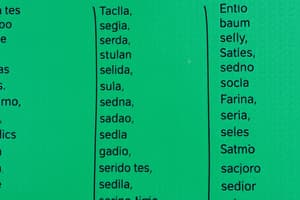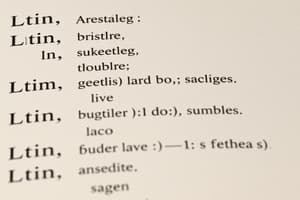Podcast
Questions and Answers
What does it mean to 'thwart' someone's efforts?
What does it mean to 'thwart' someone's efforts?
To prevent someone from accomplishing something.
How can 'digress' affect the clarity of a speech or writing?
How can 'digress' affect the clarity of a speech or writing?
It can lead to getting off the subject, causing loss of focus.
What is 'agoraphobia' and how does it manifest in individuals?
What is 'agoraphobia' and how does it manifest in individuals?
Agoraphobia is an abnormal fear of being in crowds or open spaces.
In what way does 'brevity' enhance communication?
In what way does 'brevity' enhance communication?
Describe how 'intrepid' individuals may approach challenges.
Describe how 'intrepid' individuals may approach challenges.
Flashcards
Yearn
Yearn
An intense longing or desire for something.
Intervene
Intervene
To come between two parties or things to change the outcome of a situation.
Lethargy
Lethargy
A lack of energy, enthusiasm, and motivation.
Denizen
Denizen
Signup and view all the flashcards
Thwart
Thwart
Signup and view all the flashcards
Study Notes
Verbs
- Yearn: Intense longing for something
- Crave: Strong desire
- Covet: Strong desire for something belonging to another
- Have one's heart set on something: To have a strong desire for something
- Intervene: To come between, altering a situation; to interrupt a conversation
- Intercede: To intervene on behalf of someone
- Referee: To intervene in a dispute
- Mediate: To intervene to resolve a conflict
- Interpose Oneself: To place oneself between
- Intrude: To enter without permission
- Thwart: To prevent someone from accomplishing something
- Foil: To prevent someone from succeeding
- Frustrate: To prevent someone from doing something
- Stonewall: To prevent progress
- Impede: To hinder
- Hinder: To obstruct
- Derail: To prevent something from succeeding
- Stop: To put an end to something
- Digress: To get off the subject
- Deviate: To move away from a subject or path
- Get Sidetracked: To lose focus
- Wander: To move about aimlessly
- Drift: To move slowly
- Lose the thread: To lose the continuity of a thought
- Segue: To move smoothly from one thing to another
- Transition: To shift from one thing to another
Nouns
- Appendage: A thing attached to something larger
- Addition: Something added to something else
- Addendum: A supplementary addition
- Accessory: A thing added for completeness
- Attachment: Something attached
- Adjunct: A thing added
- Intervenion: the act of intervening
- Lethargy: Lack of energy and enthusiasm
- Sluggishness: Slowness due to lack of energy
- Inertia: Resistance to change
- Torpor: Lethargy
- Languor: Lack of energy, weariness
- Apathy: Lack of interest
- Denizen: An inhabitant of a place
- Resident: A person living in a place
- Occupant: A person in residence
- Dweller: A person who lives in a place
- Queue: A line of waiting people or vehicles
- Procession: A line of people or things moving together
- Column: A vertical line of things
- Row: A horizontal line of things
- Brevity: Use of few words
- Succinctness: Conciseness
- Compactness: Condensation; conciseness
- Pithiness: Forcefulness
- Economy of language: Using few words
Adjectives
- Intrepid: Fearless and adventurous
- Unafraid: Not afraid
- Undaunted: Not discouraged
- Bold: Courageous
- Audacious: Bold and daring
- Indomitable: Unconquerable
Other
- Agoraphobia: Abnormal fear of public places or crowds
Studying That Suits You
Use AI to generate personalized quizzes and flashcards to suit your learning preferences.






